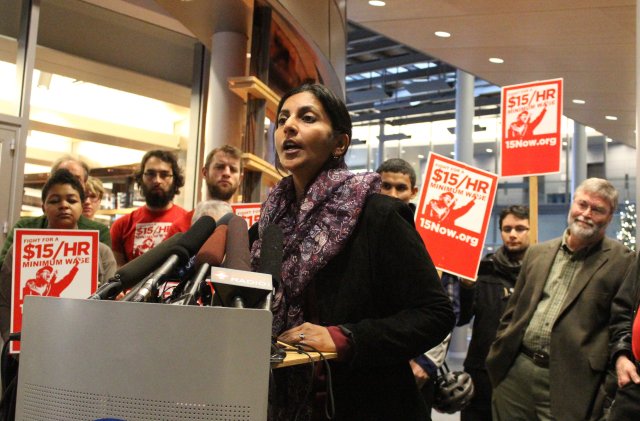
Seattle voted for working-class politics by re-electing socialist incumbent Kshama Sawant to City Council with a five point lead over her challenger.
As a result, Seattle residents can expect to see more campaigns in City Council and in the streets to fight inequality and build social justice.
“We have accomplished something historic,” Sawant said to supporters on Capitol Hill on the night of November 3 as election results came in. “We have had an open socialist re-elected to City Council.”
Sawant, who secured a municipal minimum wage rise in her first term on City Council, won Seattle's District 3 area by five percentage points over challenger Pamela Banks, who has been known to align herself with the business community.
Sawant declared the win “a strong victory for all working people, for the socialist movement,” and said her re-election signalled that “socialist politics are here to stay” in Seattle.
In November 2013, Sawant won a seat in the city's then at-large voting system as a Socialist Alternative candidate. She became the first socialist city councillor elected in Seattle in over a century.
During her first year in office, Sawant won a big campaign for working people with the vote in May last year to raise Seattle's minimum wage to $15 per hour.
Despite the achievement, Sawant remained firm that the approval was a partial win, because it allowed big corporations to phase in new wages over a few years. She vowed as a councillor and an activist to continue her fight for poor and low-income people.
Sawant has also pushed a “millionaire tax” on the wealthy and rent control as key policy issues. She has campaigned for workers' and union rights, an end to corporate influence in politics, affordable housing and tenant rights, environmental policies and green jobs, and expansion of public transit, among other issues.
Seeking re-election, Sawant ran on a platform of making Seattle affordable for everyone and building a city “free of discrimination and poverty, with racial and gender equality, where all people can work and live in dignity,” according to her campaign website.
Before running for office, Sawant was involved in Seattle's Occupy movement, which she credited with bringing issues of class, capitalism and inequality into the political debate.
The City Council race was one of Seattle's most closely watched elections, according to local media. The Seattle Post-Intelligencer described the election as a kind of “referendum” on Sawant's “working class agenda”.
The election was also the first to be run on a district voting system in over a century. While the nine City Council seats have represented the whole city in the at-large system in use since 1911, now seven of the seats are elected by district. Sawant's District 3 represents the Central Seattle area, including the Capitol Hill neighbourhood.
A majority of women councillors make up Seattle's newly elected City Council.
[Reprinted from TeleSUR English.]
Like the article? Subscribe to Green Left now! You can also like us on Facebook and follow us on Twitter.